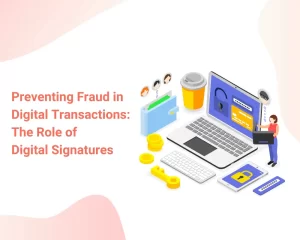In today’s digital landscape, ensuring the security of digital transactions comes first. The exponential expansion in global online transactions has exacerbated the looming threat of fraudulent activity. Nonetheless, in this challenging environment, digital signatures online stand out as a signal of confidence and security. We will delve into the critical role played by digital signature service providers such as TRUESigner ONE in improving the security of online transactions. It emphasises their crucial role in ensuring the integrity of digital exchanges and their extraordinary efficacy in preventing fraudulent operations. Digital signatures, which verify participants, ensure data integrity, and permit secure transfers, have become crucial guardians of online transactions, establishing a climate of trust and trustworthiness in the digital domain.
What is the role of digital signatures in online transactions?

Digital signatures act as virtual signatures, uniquely identifying the signer and assuring the integrity of digital documents. Online transactions are essential in authenticating the persons involved and confirming the transactional data. Their cryptographic mechanism ensures that any changes to the signed document are visible, which increases trust and dependability in digital transactions. Digital signatures offer authenticity, accessibility, and trust over online documentation.
How do digital signatures secure online transactions?
Online digital signature simplifies the signing process by providing a convenient and legally recognised method of signing documents. Digital signature services use various authentication methods to authenticate the signer’s identity, including passwords, Geo-video verification, and cryptographic keys. They also protect the confidentiality and integrity of online transactions by incorporating encryption techniques that reduce the danger of unauthorised access or alteration. In the era of numerous tech-backed fraudulent transactions, digital signatures act like a samaritan against all odds.
How Digital Signatures Help to Prevent Fraud in Online Transactions:

Digital signatures provide a significant barrier to fraudulent operations in secure online transactions. Their numerous security measures make them highly resistant to manipulation and counterfeiting. Here’s how they help to prevent fraud.
Authentication and Non-Repudiation: Digital signatures authenticate the signer’s identity and ensure non-repudiation, meaning the signer cannot deny their involvement in the transaction. This deters malicious entities from engaging in fraudulent activities, as they cannot disown their actions once digitally signed.
Data Integrity: One of the fundamental aspects of authentication digital signatures is ensuring the integrity of the signed data. Any alteration to the document after signing invalidates the signature, alerting the parties involved about potential tampering attempts. This feature acts as a deterrent to fraudsters attempting to manipulate transactional data.
Secure Transmission: Digital signature platforms such as TRUESigner ONE facilitate the secure transmission of sensitive information during online transactions. By encrypting the data using cryptographic keys, they thwart interception by unauthorised parties, safeguarding it from being compromised en route.
Regulatory Compliance: Many regulatory frameworks mandate digital signatures for specific online transactions, particularly those involving sensitive data or financial transactions. Compliance with these regulations ensures adherence to security standards, further fortifying the transactional ecosystem against fraudulent activities.
Audit Trails: Digital signatures often come with audit trail capabilities, allowing stakeholders to track a document’s entire lifecycle, including its creation, modification, and signing. This transparency not only enhances accountability but also deters fraudulent behavior.
Advantages of using digital signatures for online transactions:
The adoption of digital signatures for online transactions offers a myriad of advantages, including:
Enhanced Security: Digital signatures provide a robust layer of security, significantly reducing the risk of fraud and unauthorised access.
Cost and Time Efficiency: Digital signatures streamline transactions by eliminating the need for physical paperwork and manual verification processes, saving time and reducing operational costs.
Global Acceptance: Digital signatures hold legal validity in numerous jurisdictions worldwide, ensuring seamless cross-border transactions without physical presence.
Environmental Sustainability: Transitioning to digital signatures reduces paper consumption and carbon footprint, contributing to environmental sustainability efforts.
Improved Customer Experience: The convenience of digitally signing documents online enhances the overall customer experience, leading to higher satisfaction and retention rates.
Summing up
In today’s digital age, ensuring the integrity and security of digital transactions is critical. Digital signatures such as TRUESigner ONE are essential for combating fraud and instilling trust in online transactions. Digital signatures support the transactional framework by authenticating participants, protecting data integrity, and permitting secure communications, resulting in a safer and more efficient digital economy. Embracing digital signatures represents a crucial step toward increasing trust and confidence in online transactions, protecting the interests of all parties. This adoption ushers in a new era of enhanced security and reliability in digital interactions, paving the door for frictionless and trustworthy worldwide digital transactions.






